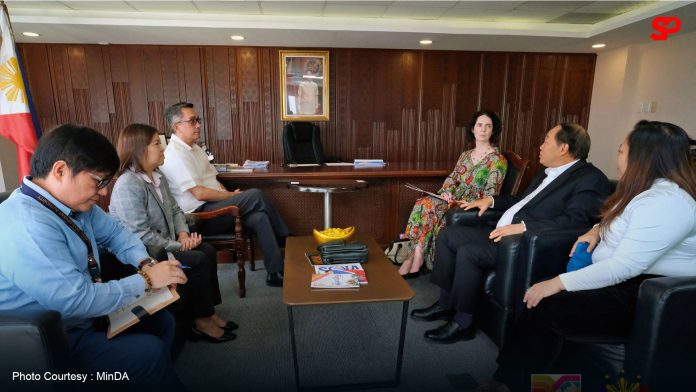By Sonya Delgado
The Mindanao Development Authority (MinDa) and The New Zealand Embassy agreed to strengthen the two countries’ partnership to boost mango production in Mindanao.
In a recent meeting with MinDa chairperson Leo Tereso Magno and New Zealand Ambassador Dr. Catherine McIntosh in Davao City, the two leaders discussed how to enhance agricultural productivity and economic resilience in Mindanao.
The discussions aimed to bolster New Zealand’s development initiatives in Mindanao, with a focus on agriculture, education, and sustainable economic growth.
Ambassador McIntosh reaffirmed New Zealand’s commitment to Mindanao through its International Development Cooperation Program, emphasizing the shared goal of fostering long-term stability and prosperity in the region.
Discussions highlighted the ongoing collaboration between New Zealand and MinDA, particularly on priority projects designed to enhance agricultural productivity and economic resilience in Mindanao.
One of the key initiatives discussed was the Government-to-Government (G2G) Mango Project, a collaborative effort aimed at revitalizing Mindanao’s mango industry.
Led by New Zealand’s Plant & Food Research and the Local Government Unit (LGU) of Midsayap, the project seeks to address challenges hindering high-quality mango exports.
The two-year, US$150,000 initiative, funded by New Zealand’s Ministry of Foreign Affairs and Trade and the Municipality of Midsayap, focuses on improving compliance with maximum pesticide residue limits (MRLs), training pesticide operators, and implementing Good Agricultural Practices (GAP).
“We need to redesign and implement systemic changes in our programs to improve mango production in Mindanao,” said New Zealand Honorary Consul for Mindanao Vic Lao, emphasizing the project’s role in ensuring the global competitiveness of Mindanao’s mangoes.
The meeting also explored opportunities for Mindanaoans to pursue educational advancement through scholarship grants in New Zealand.
These scholarships aim to empower Mindanaoans by providing access to world-class education, which in turn supports the region’s overall development goals.
Secretary Magno praised New Zealand’s proactive role in Mindanao’s development, stating, “New Zealand has been a consistent partner in addressing key challenges in the region, and we are committed to strengthening this partnership for the benefit of all Mindanaoans.”
He also expressed his gratitude for New Zealand’s sustained support and highlighted the growing international interest in Mindanao due to its improving peace and stability.
“Interest in Mindanao is growing because of the peace and security we have achieved. We pledge to both domestic and foreign partners that we will simplify processes for doing business here,” Magno said, underscoring MinDA’s commitment to fostering an environment conducive to investments.
This meeting also coincides with the celebration of 60 years of New Zealand–Philippines relations, symbolizing the enduring ties between the two nations.
This enhanced cooperation between New Zealand and MinDA aligns with President Ferdinand Marcos Jr.’s priorities on sustainable agriculture, rural development, and inclusive growth.
Through initiatives like the G2G Mango Project, both parties continue to demonstrate their commitment to fostering innovation, inclusivity, and economic growth, ensuring a brighter future for Mindanao and its people.

